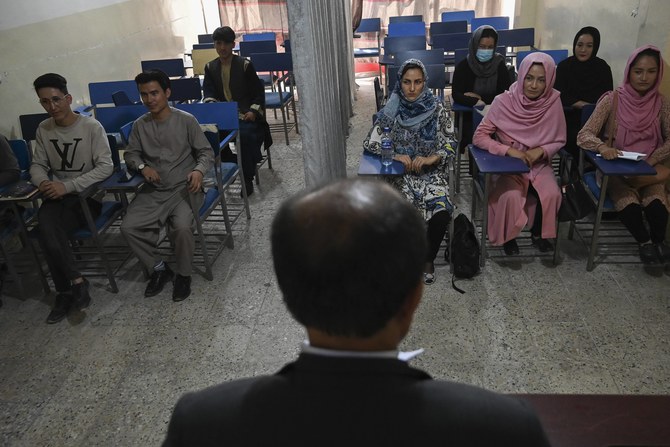ISLAMABAD: Afghanistan welcomed Islamabad's cooperation in the field of higher education and a proposal by a Pakistani distance learning university to open its regional campus in Kabul, a senior Afghan education official said on Monday.
An eight-member delegation from the Afghanistan Higher Education Ministry, led by acting Afghan Higher Education Minister Abdul Baqi Haqqani, arrived in Islamabad last week for talks on cooperation between the two countries in the fields of education and research.
The visit came amid increasing calls from the international community to reopen educational institutions for girls in Afghanistan. The Taliban’s Islamic Emirate of Afghanistan (IEA) has opened girls' schools only up till 6th grade.
“We welcome the proposal from AIOU (Pakistan's Allama Iqbal Open University) to open its regional campus in Kabul,” Engineer Roohullah Ruhani, director of promoting educational programs at the Afghan Ministry of Higher Education, told Arab News.
Ruhani said although the proposal was still at the initial level, we would welcome any type of cooperation in the field from all Pakistani universities, including AIOU. “We will facilitate them in this project,” he added.
This was a friendly way for both countries to enhance their cooperation in the field of education, the Afghan official said, adding that the entire world was aware the education system in Afghanistan was crippled by fighting over the last four decades.
“Not only we need scholarships for Afghan students but also help in reconstructing educational infrastructure, digitalization of institutions and training of teachers,” he continued.
“If Pakistan provides us help in education field we would not require any assistance from any other country in this field. As both countries were neighbors, shared cultural and Islamic values, so it will be very welcoming for us.”
Dr Bakht Rawan, an associate professor and director of public relations at AIOU, confirmed the university had sent a proposal to the Pakistani education ministry to open a regional campus in Afghanistan.
“We had already sent a proposal to our education ministry. We are waiting for its approval and after that work will start on the regional campus in Afghanistan,” Rawan told Arab News.
He said the Afghan delegation visited AIOU's main campus in Islamabad last week.
“I was part of the meeting where additional education secretary informed that they were looking into the proposal and the ministry had taken input from different departments to devise a mechanism to make it possible,” Rawan said, adding as it concerned another country, the ministry had to get input from all stakeholders before approving the proposal.
“The visiting Afghan delegation had also requested the university to help their country promote education and train teachers,” he added.
Mohyuddin Ahmad Wani, additional secretary at the Pakistani education ministry, said his ministry fully endorsed the idea and sent it to the prime minister’s office for approval.
"The education ministry has fully recommended and supported this idea as in cultural landscape of Afghanistan, distance learning is very beneficial, especially for girls' education," Wani said.
"They can study within the boundary of their homes through AIOU programs. This can provide access to education to Afghan girls."
Rawan said the AIOU vice chancellor had told the Afghan delegates that it would be an honor for the university to contribute to the revival of the Afghan education system.
“We have also offered them admission for Afghan students in AIOU campuses near the Pak-Afghan border in Balochistan and Khyber Pakhtunkhwa,” he said. “We will offer maximum available scholarships and facilities to Afghan students.”
These scholarships would be offered in social sciences, Islamic studies and Arabic language, Rawan said, adding the varsity offered its assistance in digitization of the Afghan higher education institutions as well.


















